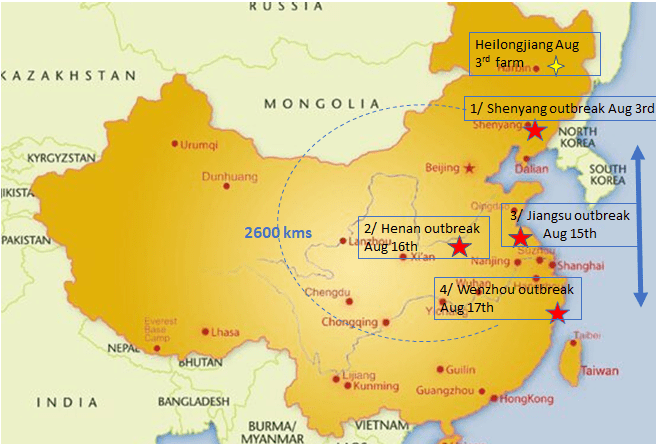A FOURTH case of African Swine Fever was found in domestic pigs in China yesterday in Zhejiang province – the first case of the disease found in southern China.
As reported last week in this original Beef Central article, China reported its first case of the serious and highly infectious African Swine Fever (ASF) earlier this month, the first reported case in east Asia. Unless it is rapidly brought under control, the outbreak in China’s massive pig population has the potential to dramatically disrupt world meat protein trade flows for all species, including beef.
Significantly, the fourth and latest detection was found in southern China, some 2600km from the first outbreak. The previous three outbreaks occurred within three days of each other, within a 1300km radius, suggesting the disease is spreading widely.
China has this week launched an Emergency Plan to control the disease.
A statement issued yesterday by China’s information office within the Ministry of Agriculture and Rural Affairs confirmed the fourth case of African Swine Fever occurred in Yueqing, Wenzhou City, Zhejiang province, after pigs in a farming community died of unknown causes. Some 430 cases of the disease were found, leading to 340 deaths.
The statement said an emergency plan had been launched and control measures taken to halt the spread of the disease. A Ministry of Agriculture steering group working with local authorities had started an emergency response and taken measures such as applying transport restrictions to prohibit live pigs and susceptible animals and products from entering or leaving the blockaded area, culling, treatment and disinfection.
China has sent a report on the disease episode to the World Organisation for Animal Health.
When discussing this with bio-security experts, this is an important step by China and highlights the seriousness and enormity of the problem.
Japan suspended heat treated pork imports
Reuters has reported that Japan has temporarily suspended the import of heat-treated pork from China.
The report said the suspension was mainly to make sure that all requirements for imported products are being met and in addition, the quarantine procedures at airports and seaports have been tightened, predominantly for travellers from the cities Shenyang and Dalian, in Northern China.
Reports of panic selling amongst farmers
The South China Morning Post yesterday reported panic selling by Chinese pig farmers trying to ensure they received better prices for their slaughter stock before contracting the virus. Unfortunately everyone apparently had the same idea, and the result is a flood of pigs being sold.
The report (click here to access) highlighted China pig prices at a three-week low of 13.71 yuan this week and are down 7.2pc year on year.
Other key points raised in the South China Post report:
- China’s pig cull topped 20,000 by Wednesday
- Purchasing demand has dropped and demand from end-users remains quiet.
- No vaccine is available for ASF, so farmers are taking their own measures to protect herds such as increasing sterilisation of pens (in some instances cleaning three time a day), adding nutrition and antivirus drugs to feed and minimising movement of livestock.
- Chinese authorities have cordoned-off infected areas and have banned movements of hogs and products in and out of infected regions with inspection points everywhere.
- Some farmers want to see a total ban on long distance transportation of pigs.
The situation in China is getting worse and many of the potential concerns and scenarios raised in the previous article are still valid, and are likely to remain so for some time yet.
This is a medium to long-term situation – within 3-6 months the size of the problem will become clearer.
According to biosecurity experts who are watching developments closely, due to the location of outbreaks, distances and density of the Chinese swine population, the ability to contain the outbreak is getting harder by the day. This degree of difficulty they believe is unlikely to change for some time to come.
In last week’s initial report on the outbreak, it was stated that to date the only solution to addressing the problem is culling both infected and potentially infected pigs from surrounding areas, which in China’s case, can mean many thousands of animals that may need to be slaughtered.
This in turn could see the glut of global pork (referred to in this previous discussion paper published on Beef Central three weeks ago), turning into a global pork deficit in a very short period.
This is effectively a game-changer in global protein supplies for years to come, which may see global meat prices (all species) strengthen, and not fall, as a result.
In discussions with global pork market experts in the US, they believe the ramifications of this disease outbreak are enormous, with cull rates being potentially as high as 30pc of China’s entire hog population or 130 million head. These views are based on previous problems of containing the ASF virus in Russia and the Ukraine.
The impact of 130 million head of hogs is 17pc of global pork production. To put this in perspective, global exports of pork only make up 7.5pc of global production, and therefore if all global pork exports were diverted into China today to meet a 30pc hog cull shortfall, it would barely meet half of the shortfall needs of the Chinese market.
There simply isn’t enough export pork globally at the moment to fill this void.

